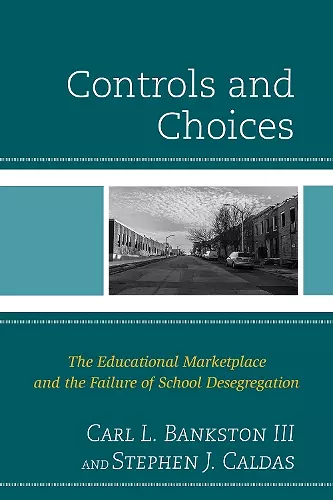Controls and Choices
The Educational Marketplace and the Failure of School Desegregation
Stephen J Caldas author Carl L Bankston III author
Format:Hardback
Publisher:Bloomsbury Publishing PLC
Published:8th Jul '15
Currently unavailable, and unfortunately no date known when it will be back

Many activists and writers have ascribed continuing racial segregation in American schools to a failure of will. In this view, forced transfers of students and other aggressive judicially mandated policies would lead to greater equality in education if only legislators and judges had the will to continue trying to make school districts conform to plans for redesigning schools and even American society.
Controls and Choices: The Educational Marketplace and the Failure of School Desegregation provides a detailed examination of the nature of the educational marketplace, supported by historical evidence, to argue that school desegregation failed because it involved monopolistic efforts at redistributing opportunities. These efforts were fundamentally at odds with the self-interest of the families who had the greatest ability to make choices in the educational marketplace. The authors use the concept of the educational marketplace to explain how market-based attempts at school reform, notably vouchers and charter schools, have grown out of the failure of desegregation and remain hampered by lack of recognition of how the schools really function as markets. Some additional key features of this book include:
Gives a clear understanding of how schools function as marketsIllustrates the argument with histories of specific school districtsLinks the history of school desegregation to school vouchers and charter schoolsIncludes easy to read and interpret graphs and figures Includes most up-to-date school population and census information
Beginning with the premise that education is a business monopoly supplying clientele for the marketplace, equity in education falls short. Comparing the populations in low socioeconomic schools with those that are advantaged and mostly white clarifies that inequity exists. The former is of less value to consumers. Further, equity in education is not necessary to provide the skills required. It does not mirror marketplace reality. Though redistribution of diverse populations through desegregation was a noble civil rights goal, it sped up segregation. Mandated attempts achieved nothing more than an initial appearance of equity, and mandated redistribution encouraged the advantaged to relocate. Deciding where they could get the best education for their children, such as private, parochial, or magnet schools, middle- and upper-class families moved. This mobility, ‘white flight,’ demographically reestablished the gap that desegregation was intended to address. One chapter provides several in-depth examples of desegregation failures. Another chapter outlines those claiming success, such as in-school desegregation; however, even those suffered from many of the same maladies. In short, after decades of desegregation in the US, desegregation has proved to be ineffective in providing educational equity.
Summing Up: Recommended. Graduate students; faculty.
Carl Bankston and Stephen Caldas have once again produced an iconoclastic, insightful book on the failure of school desegregation to produce the outcomes that most of us thought were possible after the Coleman Report of 1966. Their argument is that education, whether public or private, is a marketplace and the problem with mandatory reassignment school desegregation plans is that it converts the education marketplace into a monopoly. Those with the means to do so opt out of this monopoly and those who do not have the means stay and the outcome has been a decline in integration rather than an increase. My own research shows the same thing. -- Christine Rossell, professor emerita of political science, Boston University
This book breaks new ground in the Sociology of Education. Bankston and Caldas deftly describe how market forces play a powerful role in shaping the education of our youth. -- John C. Kilburn Jr., associate dean of research, Texas A&M International University
If you want to know anything about school desegregation, its successes but mostly failures, then you MUST read this book. In a short 162 pages, it is positively encyclopedic in its coverage of this important issue. This book is not limited to an empirical examination of the phenomenon. It also delves into the philosophical and ethical aspects of school desegregation. It is a scholarly book, but accessible to anyone interested in the subject, and that should include just about everyone. -- Walter E. B
ISBN: 9781475814682
Dimensions: 235mm x 160mm x 17mm
Weight: 376g
160 pages